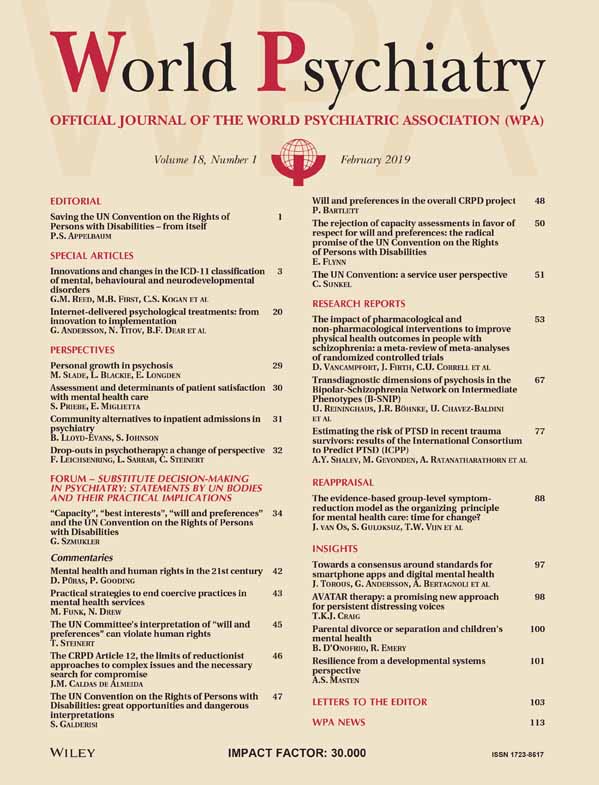Personal growth in psychosis
Recovery is a new paradigm for mental health systems globally. One implication is a greater emphasis on subjective experience – what is it like to live with schizophrenia and other psychoses?
A systematic review of the experience of recovery found that the impact of psychosis is more mixed than traditional illness models would imply1. The process of recovery was characterized as an active and life-changing experience, involving struggle and occurring both with and without professional intervention. However, clinical practice often remains focussed on deficit amelioration through treatment, rather than on supporting these active processes of change which are involved in developing an identity as a “person in recovery” .
Trauma is both a cause2 and effect of psychosis, and trauma research has identified a range of post-traumatic growth and adaptation processes which are relevant to people living with psychosis. Post-traumatic growth research focuses on the extent to which the struggle to overcome trauma can act as a catalyst for personal growth and development.
In the process of adapting to distressing experiences, including making sense of and attributing meaning to these experiences, individuals may challenge and change some of their pre-trauma beliefs. For example, aspects of personality, relationships with others and beliefs about the world can all change in a manner that the individual views as positive and reflective of personal growth.
The profile of these positive changes varies across individuals, but a consensus has emerged about five post-traumatic growth domains in which these changes typically occur: heightened feelings of personal strength; more intimate relationships with loved ones; recognition of new possibilities or directions in one's life purpose; greater appreciation of life; and engagement with spiritual and existential questions about the nature and meaning of life3.
Post-traumatic growth has clinical relevance. A meta-analysis of populations experiencing a diverse range of traumatic events found that engaging in post-traumatic growth was an adaptive and clinically beneficial process4. Higher post-traumatic growth was associated with lower levels of depression and higher levels of well-being. Post-traumatic growth can, therefore, be considered as a process that aids recovery by enabling the individual to find meaning from a painful struggle and to recalibrate his/her identity and purpose in life in light of his/her experiences.
Post-traumatic growth in psychosis is both possible and supportive of recovery. A scoping review of evidence relating to first-episode psychosis identified several forms of post-traumatic growth: developing positive character traits, making positive lifestyle changes, developing stronger relationships, greater appreciation of life and spirituality, and integrating one's experience of first-episode psychosis into one's identity5.
Predictors of post-traumatic growth in psychosis are emerging. A study of 34 first-episode psychosis participants in England found that higher levels of post-traumatic growth were predicted by lower levels of post-traumatic stress disorder symptoms, greater levels of self-disclosure behaviour, and higher self-reported recovery6. Similarly, a study of 121 community rehabilitation service users with psychosis in Israel found that post-traumatic growth is mediated by coping self-efficacy appraisal and meaning-making7.
In relation to meaning-making, an important aspect of post-traumatic growth in psychosis is the opportunity for validation and collective identity offered by peer-support networks. For example, the International Hearing Voices Movement (HVM) has worked in partnership with academics and clinicians for the past 30 years to promote more accepting and empowering perspectives on what has traditionally been an extremely stigmatized and marginalized experience.
One aspect of this approach is helping members to develop a positive identity as someone who hears voices. A central philosophy of the HVM has been that the ownership and interpretation of one's voices always belongs to the individual voice hearer. Correspondingly, a great emphasis is placed on personal testimony and meaning-making, in which distressed individuals are supported to find explanatory frameworks that are subjectively useful and significant. Thus, while psychosocial models have been strongly promoted within the HVM, including the links between trauma and voice hearing8, they are not privileged; alternative explanatory frameworks, such as spiritual or cultural, are seen as equally valid.
The HVM perspective is that even the most devastating periods of mental ill-health can ultimately be a source of personal development. Many narratives from HVM members show how psychiatric crisis has prompted, for example, a greater capacity for political activism, emotional insight, creativity, courage, and compassion for self and others.
The idea of relocating voice hearing from being a meaningless disease symptom to a personally significant event that can inform and guide one's recovery journey has resonated with many mental health service users. There has been a rapid expansion of HVM networks across Europe, Australasia and North America, with initiatives currently emerging in Asia, Africa and South America: “the HVM appear[s] to offer an attractive alternative for voice-hearers who have not been fully helped by traditional approaches, who are searching for greater understanding and acceptance of their experiences, or who feel that their stories have not been heard or acknowledged”9.
We identify three clinical implications. First, clinical assessment should include trauma and its effects. An insight offered by the HVM is that it may be as useful to find out “What's happened to you?” as opposed to “What's wrong with you?” . Second, promoting post-traumatic growth is an approach to supporting recovery. The five established domains of strengths, relationships, life possibilities, appreciation and spirituality provide an assessment framework which may have clinical utility, both for encouraging therapeutic optimism that a more positive future is possible and for identifying points of intervention.
Finally, supporting people who live with psychosis to make personally-meaningful sense of their experiences is a different skill to promoting insight, and may require new clinical approaches which avoid imposing explanatory clinical models. The expertise of organizations such as the HVM may be needed in the mental health system.




